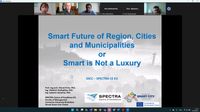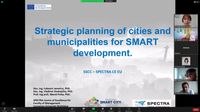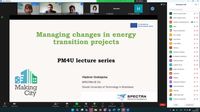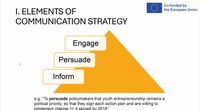Search
Summer 2025 International Classes Week
Project management for EU urban transformation in the context of climate change and energy transition
Lecture Week details
Summer 2025 International Clasees Week explored how project management drives EU urban transformation amid climate and energy challenges - and all sessions shared their slide decks. Materials include: Managing changes in energy-transition projects with the Trenčín PED/Making City case, Strategic planning for SMART development and EU ITS/ITI frameworks, Smart Future of Regions, Cities and Municipalities - from high-tech to smart, nature-friendly solutions, and Communication in Project Management covering internal/external comms, branding, and a 5-step EU project comms plan.
Objectives:
- By the end of the lectures, participants will be able to:
- Understand the EU context for urban transformation, climate, and energy transition.
- Choose and tailor a project-management approach (roles, roadmap, governance).
- Draft a one-page project charter (scope, timeline, budget, benefits).
- Map stakeholders and create a basic communication/engagement plan.
- Build a simple funding mix (EU programmes + co-financing) and procurement path.
- Identify key risks/assumptions and propose mitigations.
- Define success metrics (KPIs) and a light monitoring & evaluation plan.
- Outline how to use data/GIS/digital tools to support decisions.
- Learn from real case studies and apply ready-to-use templates.
Target audience
- City & regional authorities (planning, climate/energy, transport)
- EU-project teams & managers (public sector, universities, NGOs)
- Master’s/PhD students and researchers (PM, planning, energy, urban studies)
Teachers
- Maroš Finka — Professor at STU Bratislava//Comenius University (and Shanghai Jiao Tong); former AESOP President (2020–2022) and Director of the SPECTRA Centre. Expert in European spatial planning and smart, sustainable urban development; led dozens of national/EU projects and is a Danubius Award laureate.
- Lubomir Jamečný — Head of Spatial Planning and Deputy Director for International Relations at STU/Comenius University. EIA/SEA certified; teaches and supervises across levels; contributor and manager on H2020, Interreg, Erasmus+, ESPON projects; focuses on strategic and spatial planning and SMART approaches.
- Vladimír Ondrejíčka — Associate Professor and Deputy Director for science/research–practice cooperation at STU/Comenius University. Works on Horizon/Interreg projects; specializes in energy-positive districts, energy communities, smart regions/cities, urban security; certified in SEA/EIA.
- Milan Husár — Associate Professor at the SPECTRA Centre, STU/Comenius University. Researches smart cities, biodiversity, brownfield regeneration, and multilevel governance; Fulbright scholar (ASU); served on AESOP’s Executive Committee and as Slovakia’s representative in AESOP bodies.
Schedule
| Time | 10.30 - 16.40 |
|---|---|
| Monday, 2.06.2025 | prof. Marosh Finka, Ing.arch., PhD: Smart Future of Regions, Cities, and Municipalities — or Smart Is Not a Luxury |
| Tuesday, 3.06.2025 | Ing. Ľubomír Jamečný, PhD.: Strategic Planning of Cities and Municipalities for SMART Development |
| Wednesday, 4.06.2025 | Doc. Ing. Vladimír Ondrejička, PhD.: Managing changes in energy transition projects |
| Thursday, 5.06.2025 | Doc. Ing. Milan Husar, PhD: Setting up effective and impactful communication within EU projects |
Study Materials
The Summer 2025 International Classes Week materials include four thematic lecture sets prepared by international experts. Each set combines presentations, reading resources, and practical exercises designed to develop professional competencies in project management and urban transformation within the European context.
- Communication – explores effective communication strategies in project management, stakeholder engagement, and intercultural collaboration in international projects.
- Energy Transition – focuses on the shift toward renewable energy, sustainable technologies, and project management tools supporting the EU’s green transition goals.
- Smart Is Not a Luxury – discusses digitalization, smart city solutions, and the role of innovation and data-driven tools in managing urban development.
- Strategic Planning – introduces methods and instruments for long-term urban and regional planning, linking spatial development with sustainability and resilience principles.
Together, these materials provide a comprehensive overview of current trends and challenges in managing EU urban transformation projects.
Here you can download Study Materials.




